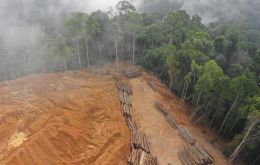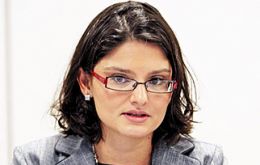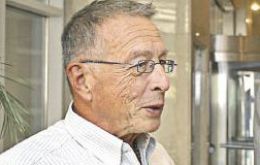MercoPress. South Atlantic News Agency
Tag: Tatiana Prazeres
-
Saturday, October 28th 2023 - 01:12 UTC
Brazil in Brussels: EU anti deforestation law will impact 34% of Brazilian exports

The government of Lula da Silva estimates that the new European Union, EU, anti-deforestation law will have a 34% impact on Brazilian exports to Europe and 15% on the country’s total exports. Folha de Sao Paulo informed the measure applies to products in the supply chains of coffee, soy, palm oil, wood, leather, beef, cocoa, and rubber.
-
Friday, May 3rd 2013 - 02:31 UTC
Brazil with trade deficit for third month running; government blames change in fuel tax accounting

Brazil recorded in April its third trade deficit in four months, trade ministry data showed on Thursday, another weak result that reflects the deterioration of the country's trade balance due to a sluggish global economy and struggling local industry.
-
Thursday, April 4th 2013 - 07:51 UTC
Brazilian industrial production continues to struggle despite all the incentives

Brazil’s industrial output shrank more than expected in February, reversing most of the previous month’s gains and casting fresh doubt over the health of an anaemic recovery in the struggling sector.
-
Wednesday, February 8th 2012 - 06:17 UTC
Argentina and Brazil want corporations to reinvest and not send profits overseas

President Cristina Fernandez hopes to convince Brazil to join Argentina in its campaign against the multinational corporations in an effort to balance trade balances in the midst of the global crisis spurred by the Euro crisis, China’s slow reaction and the US economy which still has to recover from the full impact of the 2008/09 recession.
-
Tuesday, February 7th 2012 - 06:15 UTC
Argentina/Brazil admit ‘good understanding’ in round of trade talks to lift restrictions

The meeting between Argentine and Brazilian officials to discuss the new trade legislation implemented by the government of President Cristina Fernandez ended in a “good understanding”, said participants of the Monday meeting.
-
Friday, February 3rd 2012 - 17:56 UTC
Brazilian minister travels to Argentina to discuss latest set of import obstacles

Brazilian Secretary of Foreign Trade Tatiana Prazeres will be travelling to Buenos Aires next Monday to address with Argentine counterparts the extent of the last set of measures implemented by the administration of President Cristina Fernandez to slow down the flow of imports.
-
Thursday, February 2nd 2012 - 05:47 UTC
Brazil will evaluate the impact and legality of Argentina’s latest trade barriers

The Brazilian government expressed concerns over the new Argentine trade barriers going in effect on Wednesday and informed that it would “evaluate its impact and legality” before making any decisions, Foreign Trade secretary Tatiana Prazeres announced.
-
Friday, September 2nd 2011 - 05:09 UTC
Record foreign trade activity in Brazil; 8 month surplus equals all 2010

Brazil's trade surplus grew more than expected in August as the value of exports climbed to its highest this year, outpacing strong import growth.
